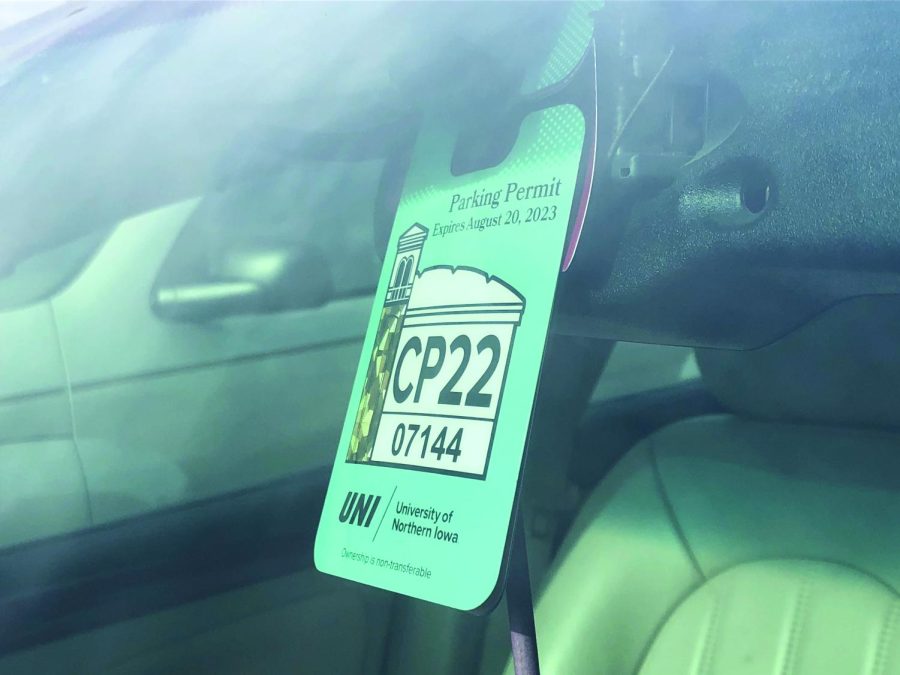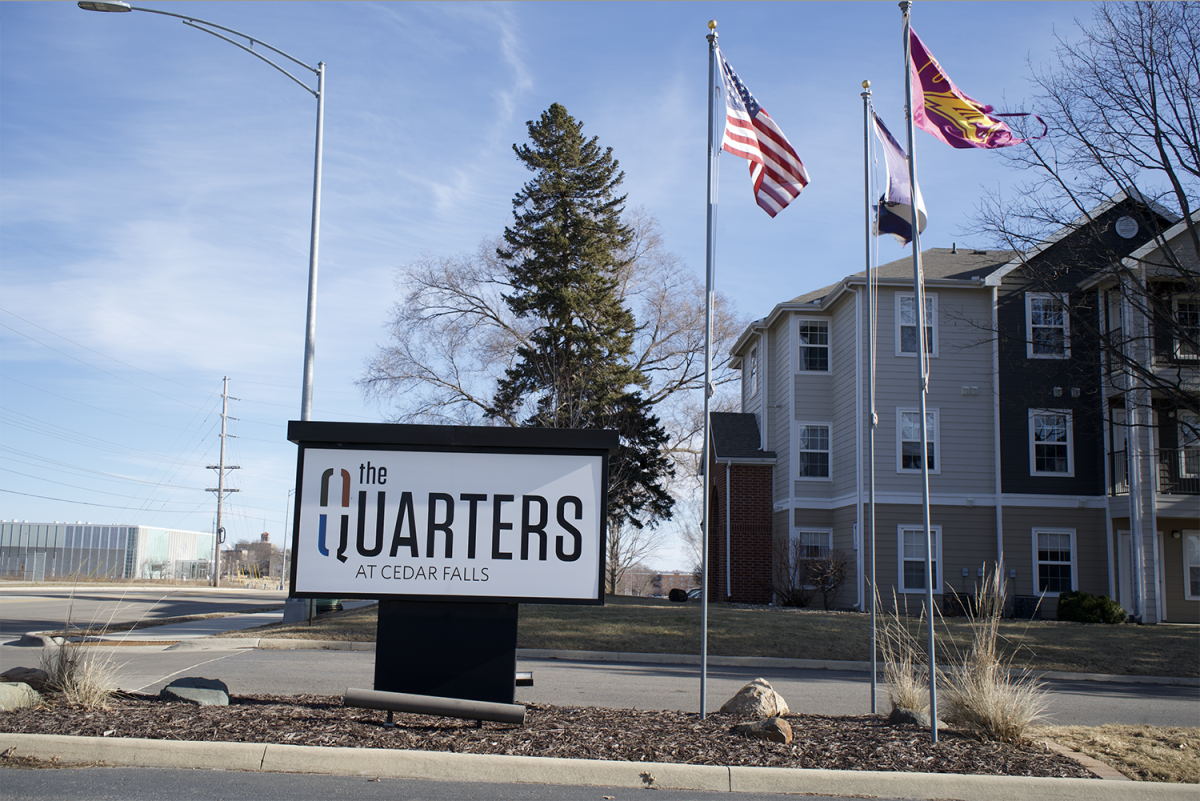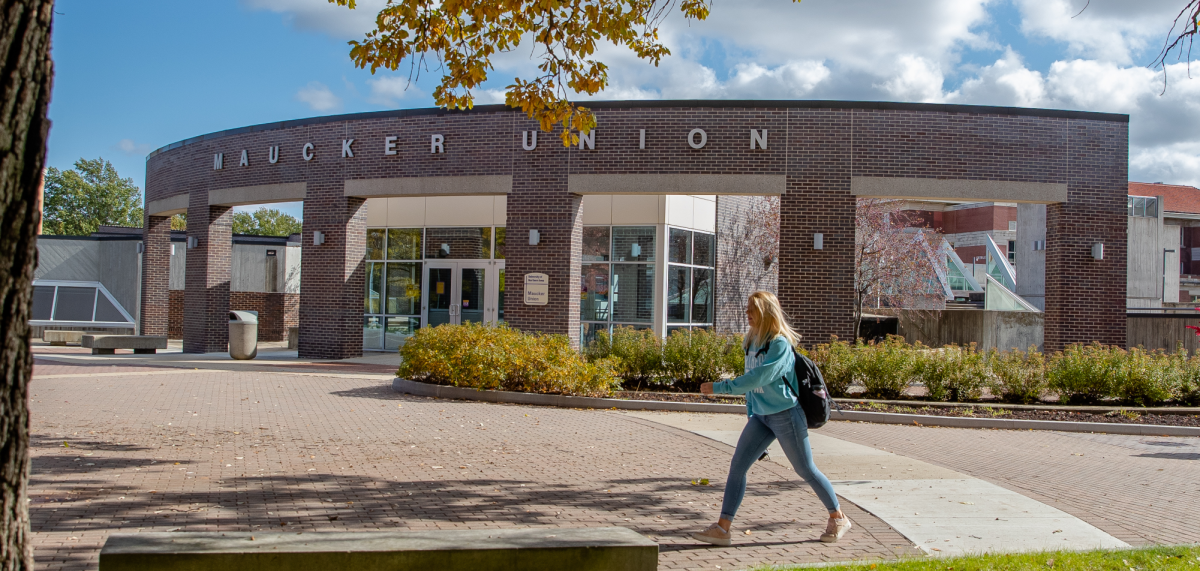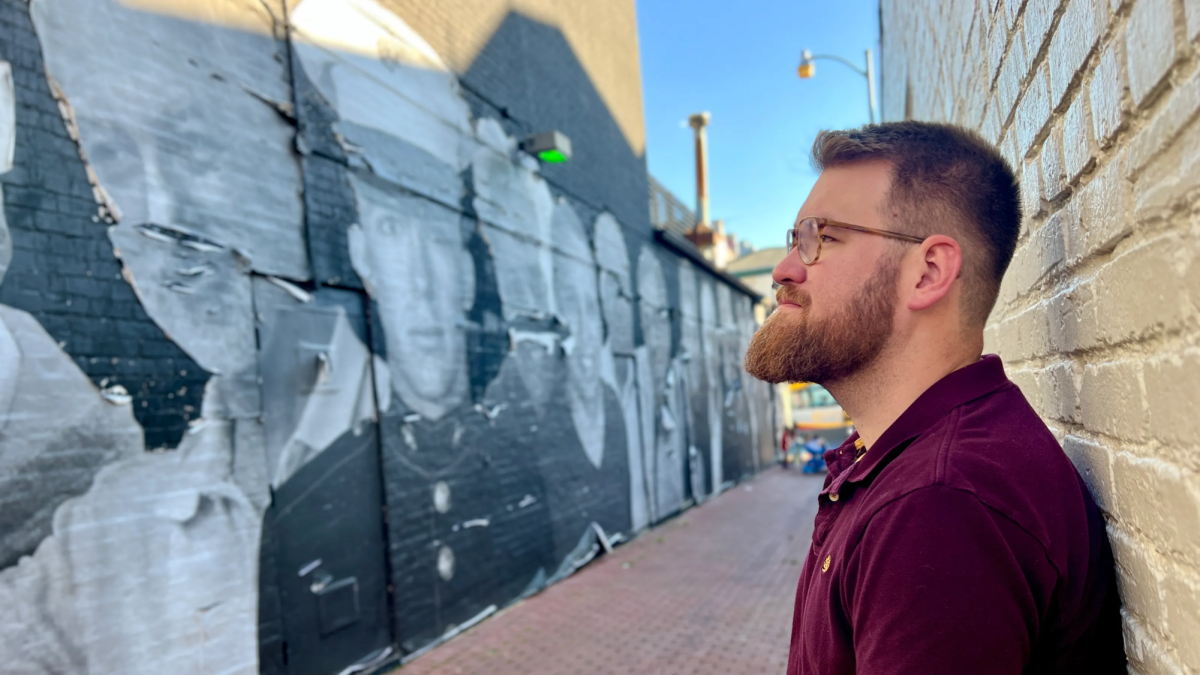Northern Iowan: So, football playoffs, Panthers made it in! How do you feel about that?
President Bill Ruud: Two things: number one I feel great for the football team because it’s, uh, you know, the end of a great season. We started off 3 and 4, we won the last five and we won the last five handily and we won the last five, beating two ranked teams. But secondly I think it’s very important for the community, for the university. It ought to be evidence that athletic teams, with basketball, with football, with hosting the volleyball women’s MVC playoffs, we get exposure and when we get exposure, people ask the questions. It’s great, I think it’s great for us. I think we [have] got a couple three kids that are going to do great. And I think it’s great for recruits, I think we had, like, 35 recruits at the last home football game. [We get] a lot of support from the community and, I think also, a lot of support from people who are interested in otherwise supporting the university. I’ve always said there are two windows on the world of a university; one is performing the fine arts, the other one is athletics. A lot of people get exposed to the university through athletics and then they ask the other questions. They say, “What about your English program, your physics program, your math program, your science program.” And as they get interested in that, you would be surprised about the – oh, I just had lunch with a donor yesterday. He’s a physician, he’s down in Iowa City. They have two children that went here, he’s kind of in the prime of his career and they started a scholarship but their thinking of starting other scholarships. I would say football and athletics is very important at the University of Northern Iowa but it’s not everything. It puts us on the map, a lot of exposure, gets us a lot of students here that wouldn’t otherwise come and we’re very fortunate that we have a lot of high-quality student athletes. We don’t have, knock on wood, some of the challenges, maybe, that some of the other universities have, so I think it’s a tribute to our athletic program. So, hopefully we’ll win and keep on playing. I mean that’s the challenge, we keep winning, we keep on playing every Saturday. Athletics, journalism, science, faculty grants, fine performing arts all give us the kind of exposure we need at the university to say “Hey, you’re great,” and students and faculty will want to come.
NI: So then, are you proud of our football team?
Ruud: Oh yeah. Well, I’m most proud of their grade point average. Last semester it was 2.82. [One] Hundred young men on a football team to have a grade point average of 2.82 while they’re playing football, that’s probably one of the things I’m most proud of and I’m most proud of their character. You watch, uh, Tim Kidd, one of our faculty members over in physics, went over on the trip to Missouri State and he just said, “I was wowed. They were professional, they were young adults representing the University of Northern Iowa with great character, great presence, great poise both on and off the field. And when a faculty member can say that unsolicited, then you know you’ve got a bunch of good young men who are engaged that are in athletics.
NI: I’m going to transition subjects, Ferguson, Missouri, just had quite [a reaction to] the verdict from the grand jury. How do you think students can relate to what happened in Ferguson to what happened with the Yik Yak [situation]?
Ruud: First of all, as many have said, it’s tragic any time, anyone, but especially when a young person loses their life, regardless of circumstances. So I think, I’m hopeful folks can reach out to his family and reach out to the folks in Ferguson, Missouri. And I kind of agree with [President] Barack Obama and I kind of agree with some of our sports icons: We [have] got a lot of work to do. I think the issue is continuing to say, “We need to communicate, we need to understand, we need to engage.” I think it tells us as a university we need to reach out to students, I think it tells the students they need to reach back out, not only to other students, but to us. As the moraes and customs change . . . I think we’re a learning environment and we need to make sure our on-campus police, our off-campus police, uh, communicate, understand. I think we need to raise issues, I think we need to help get as many folks in the education system as possible. Work with our local community. I think there’s a lot of very positive activity that’s being overshadowed, maybe, by some of the stuff that’s happening in Ferguson. I think we need to celebrate a lot of the successful programs and then help folks learn and get more young people exposed to colleges and universities. Understand what the advantages are, understand the advantages of coming, getting engaged, getting involved and then we, as a partner in this community, this community and other communities, make sure we reach out within the communities Cedar Falls and Waterloo and engage in projects, engage in rebuilding the community, engage in having students involved. I’m very proud of our UNI-CUE operation- our UNI-CUE program over in Waterloo. Robert Smith and his staff, I mean that’s a miniature university that is engaged in the community and people love going to UNI-CUE, young student that never would have thought about going to college – get engaged as a middle school, high school student in UNI-Q. I just gave a presentation over in Waterloo East High School. I was very impressed with the young people over there, so I think Ferguson, it’s a tragedy, it’s unfortunate regardless of where you are in terms of your opinion about what should have or shouldn’t have happened. I think from here, you know I subscribe to Martin Luther King, violence isn’t the answer but conversation is. One of the things I would tell students is, “Hey as we learn, as we get better at what we do, as we get rid of ignorance and misunderstanding in the world, the students need to be comfortable in some of our 250 student groups; let’s go out and do, let’s go out and raise our voices . . . make sure the voices are raised.” I love the rally that we had a couple days after the Yik Yak transaction. The Day of Solidarity was fabulous, just seeing four, five, six hundred people out there. If you see something, regardless of what it is, that ain’t quite right, we need to create an environment where you can feel comfortable doing that.
There’s lots of stuff out there. Understand that we’ve done an awful lot in this country, we need to do more. We need to subscribe to the issue that we need to do more. But that doesn’t minimize suffering of the family in Ferguson. It doesn’t minimize the young person who was shot and killed. So we need to, as I read somewhere in the paper, we need just to continue to figure out how to make things better.
NI: Do you agree with the rally held in Lincoln Park in Waterloo [in response to the grand jury’s verdict]?
Ruud: I am of the Martin Luther King Jr. era, I subscribe to purposeful, nonviolent protests and conversation. I think this is a great country where we can assemble and we can talk about issues, without the fear of not being accepted, not being heard, but I think that is a piece of it. We need to go [do] more. If we don’t like laws we need to talk to our legislators, if we don’t like some things in the community we need to talk to community leaders. But there’s nothing more powerful than multiple segments of the community: students, community members, people from Cedar Falls, people from Waterloo getting together and saying “Hey, we’re concerned and there are going to be action steps following this that make it happen.” I always remind students that if they want to go down to the steps of the capital and protest, great, it’s fine, do it. I probably did a little bit of it when I was in college in the 60’s and 70’s, but go beyond that. Go beyond, make the appointment with the local elected official, make the appointment with your community leaders. Get a group around you of other concerned citizens, so protesting is one of the luxuries of the United States of America, especially nonviolent protesting and I encourage any kind of protesting to be nonviolent, but make sure we think about that next step. The other thing, as we do things significantly, celebrate them.
NI: Regent Carroll, I heard that she resigned. Do you think Branstad is going to elect [appoint] someone soon?
Ruud: That’s “Your Favorite Governor Branstad.” Well first of all I will say Nicole Carroll was a joy to have on the committee, on the Board of Regents. You know, she’s from western Iowa, which gave a great perspective for western Iowa. She was an attorney, so I always used to tease her; she’s very thorough. You could count on Nicole Carroll, regardless of the agenda, regardless of the material, regardless of the topic of discussion, by golly, she read it, she yellow-ed it, she highlighted it, she had questions about it. She never hesitated to call me up before a meeting and say, “Hey what about this? What about that?” So, we’re going to miss that. But I understand her husband’s a physician and he sold his practice, my understanding is that he’s engaged in some additional education. Now, here’s a family practice doc and he’s involved in a program down in Corpus Christie, [TX], that helps try to train better family practice docs. So they moved down to Corpus Christie. So we’re going to miss her. What’s going to happen? Well, I’m hopeful that, uh, and I don’t know if we have enough time. It’s what, the next meeting is the third of Dec? I don’t know if by the third of Dec. with Thanksgiving, the day after Thanksgiving, two weekend days and two week days for an appointment. I would not be at all surprised if there was an appointment to fill her position before, I think she’s got a couple years left on her term, I would like to see a full complement of Board of Regents members. I would not be surprised if by the end of the year that Nicole Carroll’s position was filled by a Terry Branstad appointment. I’m sure Gov. Branstad, among the many , many other things that he is doing, is getting some input and some suggestions from people who might be a great replacement for Nicole Carroll. Maybe, probably, someone out of western Iowa because that was a great value to the board, even though Sabhash Sahai was from your community, that’s kind of western Iowa, but we need as much exposure as we can to all of Iowa. So to have another appointment from Sioux City, from Council Bluffs, Red Oak I think would be fun and engaging for us. I’m hopeful that appointment will come soon.
NI: With the possible tuition freeze? (1.75% was the original number for appropriate with a matching 1.75% increase in tuition, Ruud said)
Ruud: We have said, and I have said since I’ve been here, tuition freezes are great, they’re great for families, they’re great for students. The challenge is how long you can tuition freeze before you’re forced to raise the tuition an inappropriate amount. I think one of the things you’ll see in California, I think they’ve been in a tuition freeze for about 4 years and now they’ve come back out and said “We’re going to raise tuition 5 percent a year for the next three or four years. My position is, and I kind of share the position of Kevin Gartman, the student government leadership, and I think most of the students on campus a normative, small, regular increase in tuition over a period of time is much more acceptable to families. If I say to you, “We’re going to raise tuition $50 a semester for the next five years,” you’re like, “OK, I’m good with that, I know where I need to get $50 from, it’s a fair number. I know how long I['ve] got to plan for it.” There’s not going to be a big surprise next year or the year after where all of a sudden it’s like, “Hi, we’re going to raise tuition $500.” But even I use the example of if we raise tuition $100 a semester for the next five years, that’s $1000. Most students and families will look at that and say, “OK, that’s $100, I can live with that. That’s ten more hours of work a year that I can do.” But on the other hand, if we freeze tuition for two or three years and then raise it $500, which would have been less than if we raised it $100 a semester, rightly so, everyone gets upset. It’s kind of like parking, we’re good at that. You know, parking’s $50 and we don’t raise parking for four or five years and then all of a sudden it’s like, “Oh my goodness, we’ve got to pave the parking lots,” and we raise the parking fee $50 and then you guys are all upset and we go, “Why are you all upset?” If we would have raised parking fees $5 a semester, nobody would have noticed and we still would have had the $50 increase five years down the line. I think tuition freeze is definitely a conversation. I think, obviously as I said, it would benefit a lot of families, a lot of students, but I worry that sooner or later we’re going to have to dramatically increase it.
The other thing that is important to us is that we would need the backfill of the money that we wouldn’t get in a tuition freeze. So that $1.3 million were ever to come as an additional appropriation to us so that we can continue to do what we need to do to make sure students have classes, students graduate, students have the facilities, et cetera in terms of moving the institution forward. So, tuition freeze disproportionally affects us because we have 90 percent of our students that are in-state, so we have roughly 80 percent of our net revenue comes from in-state resident students. I think at Iowa and Iowa State it’s 35 or 40 percent of their net revenue comes from in-state students. So we get [impacted differently] in a tuition freeze because you can make up more of the money with an out-of-state tuition increase. It’s important to show you, our out-of-state tuition is $16,000. I think there’s an assumption that Iowa’s out-of-state and Iowa State’s out-of-state tuition is also $16,000. Wrong. Iowa State’s out-of-state tuition is $21,000 and the University of Iowa’s out-of-state is $25,000. So, for every student that comes from Illinois to the University of Iowa, is $25,000. They have 10,000 students from the state of Illinois – that’s $250 million. And think about it, same 10,000 students, if they raise out-of-state tuition, pick a number, $500, that’s $5 million. If we raise out-of-state tuition $500, that’s $500,000. It’s just different levels of size of what they can and cannot do and different kinds of students that makes in-state tuition freezes that kind of impact and effect. Tuition freezes are great. Don’t ever let anybody tell you that Bill Rudd thinks tuition freezes aren’t great. I just worry about that long-term impact.







